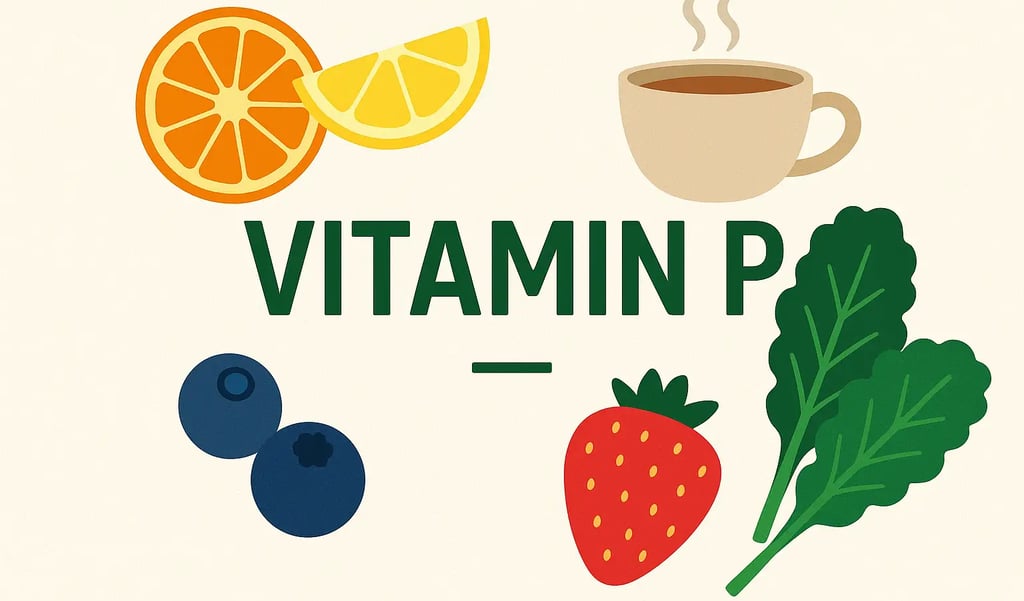Vitamin P (Bioflavonoids): Benefits, Food Sources, and Side Effects Explained
Discover what Vitamin P is, its health benefits, natural sources like citrus fruits, and potential risks. Learn how bioflavonoids support immunity, heart, and skin health.


🌿 What Is Vitamin P? A Complete Guide to Bioflavonoids
Vitamin P, also known as bioflavonoids, is a collective term for a group of plant-derived compounds known for their powerful antioxidant and anti-inflammatory properties. Though not a vitamin in the traditional sense, Vitamin P plays a vital role in maintaining vascular health, enhancing immunity, and supporting skin and cellular function.
The term originated in the early 20th century when researchers discovered that certain plant extracts improved the absorption and effectiveness of Vitamin C. These compounds—like quercetin, rutin, and hesperidin—were grouped together and labeled as Vitamin P.
While not officially classified as a vitamin, bioflavonoids perform vitamin-like functions by strengthening capillaries, promoting circulation, and protecting the body from oxidative stress.
🩺 Health Benefits of Vitamin P (Bioflavonoids)
Vitamin P offers a wide range of health advantages, particularly due to its antioxidant, anti-inflammatory, and cardiovascular-supporting properties:
Health Benefit Explanation💓 Cardiovascular Health Improves blood flow, reduces blood pressure, and strengthens blood vessels.🛡️ Immune System Support Enhances immune cell activity and reduces oxidative stress.🌟 Skin Protection Fights free radicals, reduces inflammation, and supports skin repair.🧬 Anti-Cancer Potential May inhibit tumor growth and support cellular health (research is ongoing).
Bioflavonoids also work synergistically with Vitamin C, boosting its absorption and effectiveness in the body.
🍊 Food Sources of Vitamin P
Incorporating foods rich in bioflavonoids into your diet is essential for reaping the benefits of Vitamin P. Here are some of the best sources:
Food Category Examples🍊 Citrus Fruits Oranges, grapefruits, lemons, limes🍓 Berries Blueberries, strawberries, blackberries🥬 Leafy Greens Kale, spinach, collard greens🍵 Herbal Teas Chamomile, green tea🍅 Other Vegetables Onions, broccoli, tomatoes
✅ Tip: Add berries to breakfast bowls, citrus to smoothies, and sip on herbal tea throughout the day for a Vitamin P boost.
⚠️ Potential Risks and Considerations
While Vitamin P is largely beneficial, certain precautions are essential:
Over consumption Risks: Excessive intake of supplements may cause health complications.
Medication Interactions: Individuals on blood thinners or anticoagulants should consult a doctor before increasing Vitamin P intake.
Chronic Conditions: People with liver disease or bleeding disorders should take professional guidance.
👉 Always consult a healthcare provider before starting any new supplement or making major dietary changes.
🔍 Conclusion
Vitamin P may not be a traditional vitamin, but its contribution to heart health, immunity, skin care, and disease prevention is undeniable. By consuming a balanced diet rich in citrus fruits, berries, and leafy greens, you can naturally boost your intake of bioflavonoids and support your overall health.
